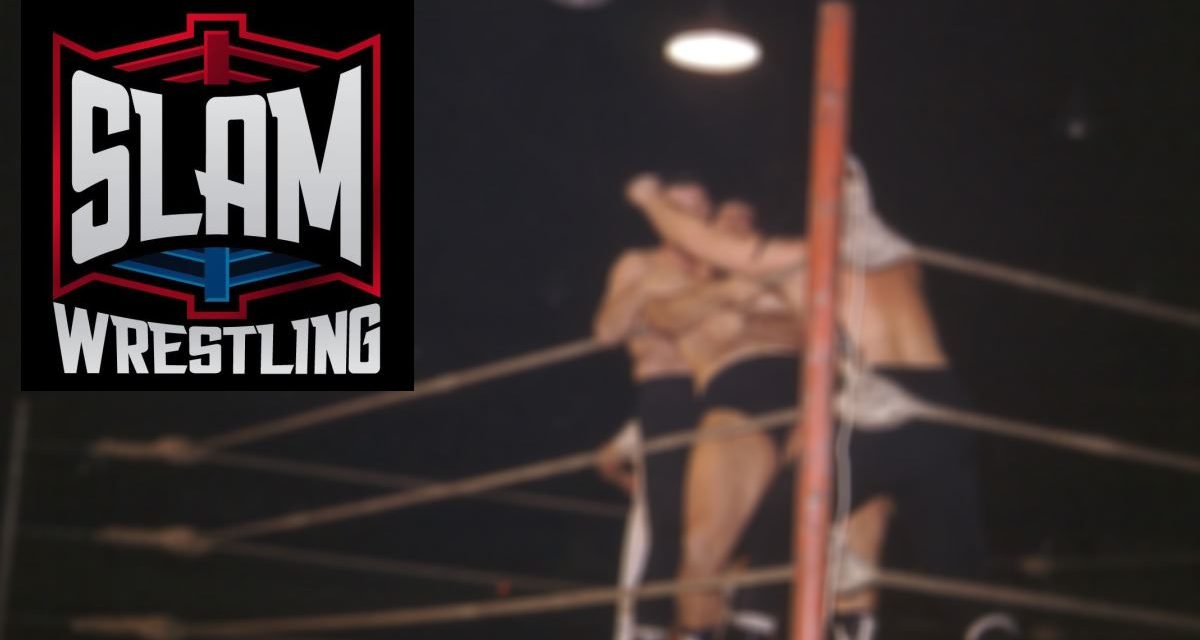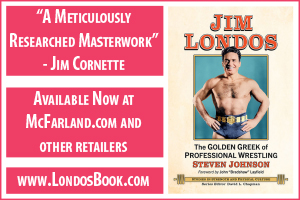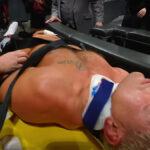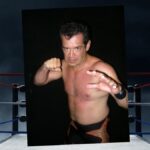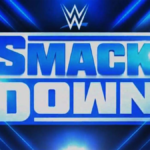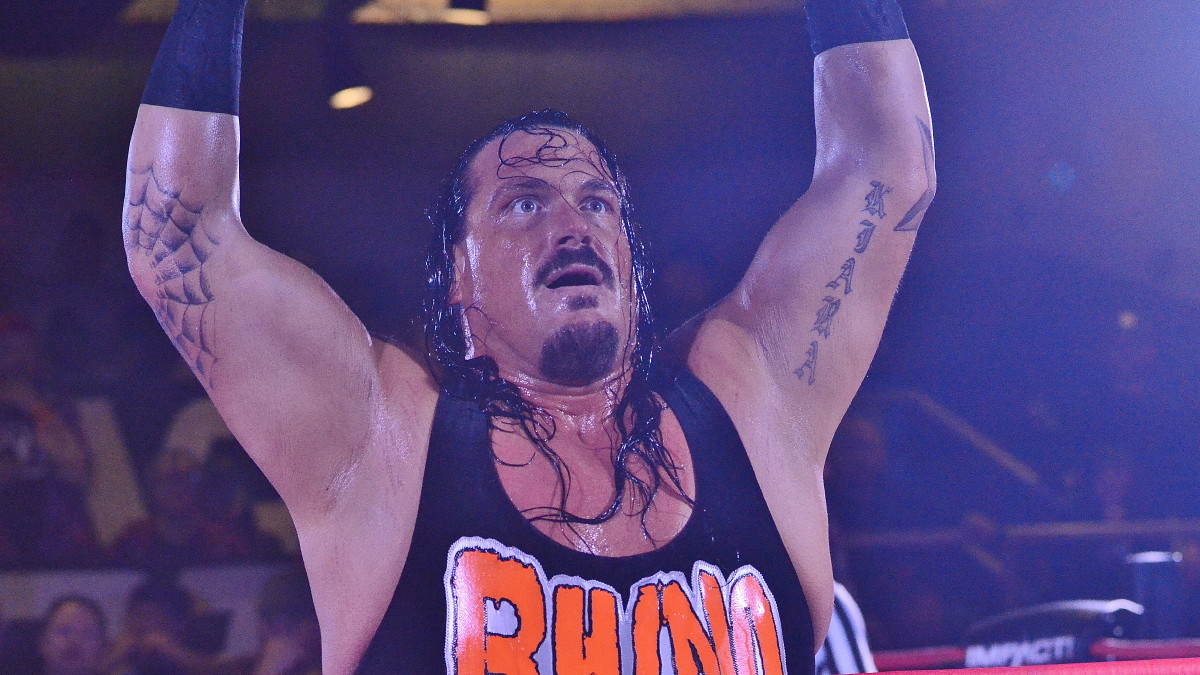There was never any doubt in Jet Star’s mind that he would spend his life in the body business.
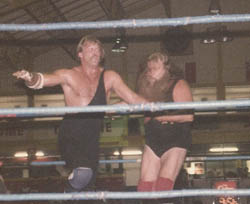
Bearman Dave McKigney launches Jet Star into the corner during a match in August 1985 in Cornwall, Ontario. Courtesy Maple Leaf Wrestling – Pictorial.
Whether it was in a wrestling ring attempting to dislocate various parts of an opponent’s anatomy to set up a pin or in an auto body shop hammering out dents or grinding down a vehicle for a paint job, Star was in his element.
Although no longer active as a pro on a regular basis, he is that rare breed of wrestler who is ready to climb into the ring at a moment’s notice when the opportunity presents itself. Like many before him, he also pines for an era in the business that has passed by all too quickly.
Born in 1957, Star grew up as Doug Ramsey in Aurora, Ontario, and while an early high school dropout, pursued a career in the auto body business at age 17. But he also had other ambitions. Perhaps influenced by his grandfather Jack Love who appeared in a strongman show as Kid Beavitt, Ramsey hankered to get into a physical type of activity.
By choice or convenience, he joined the Professional Karate Association and was trained in martial arts. But as he progressed in his training and entered several in-house qualifying events, Ramsey suffered a knee injury. The knee did not respond to treatment and after popping it a second time, he decided to pursue other fields.
Enticed by a newspaper ad, he enrolled in Phil Watson’s wrestling school and quickly took a liking to the rough and tumble style of the game. He was well aware of Watson’s lineage as every kid in Ontario knew of the exploits of Phil’s father, the legendary Whipper Billy Watson. The fact the training school was located in the back of a carpet shop in Mississauga didn’t deter the ambitious students.
Although the younger Watson was a tough taskmaster, Ramsey proved to be one of his more formidable performers and soon, teacher and student shared a mutual respect for each other. Even when Doug was having difficulty coming up with the money for training, Watson saw something in him and carried him. From there, the progression to the professional mat took its logical steps.
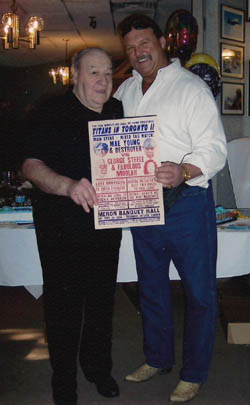
Duncan McTavish and Jet Star. Photo by Roger Baker.
In short order, he was appearing under his real name for George Cannon out of Windsor. His first opponent was veteran Ben Justice. Even though Justice hadn’t worked for several years, he subdued young Ramsey with a sleeper hold in 14 minutes in a TV match. But Justice was impressed with the kid’s potential and made a point of encouraging him after the match to stay with his goals.
From that starting point, he was all over the map, picking up much needed experience and heeding instructions from promoters to play it straight as a baby face. He worked for Frank Valois in Montreal in a promotion that boasted Gino Brito and Dino Bravo as well as Edouard Carpentier and Andre the Giant. In such august company, it was a chore for young Ramsey to carve his own niche. Ramsey worked as a jobber and would tape as many as a four shows for television all in one day, to be shown over a month. He did the same thing for Dominic DeNucci in Philadelphia.
“I remember meeting Billy Robinson. I always thought he was a clean, scientific type, but jeezus he stretched me so bad, I was touching parts of my body that I had never seen before. Lord Al Hayes was his manager and they worked me over pretty good,” recalls Star, painfully. “I also went against Mike York and came out of that one with a few cracked ribs and a broken elbow. He threw me at the top rope and I missed it and went out of the ring.”
It didn’t take Ramsey long to realize he needed his own gimmick. In 1983, he decided to work as a heel. It was the fit he knew he wanted if he was to advance his career.
“My nickname as a kid had always been Jet,” he explained. “A friend added Star and I became Jet Star.”
While he didn’t pattern himself after any one specific wrestler, he was looking for an identity that was a collective of all that he had seen. He was always impressed with stylish guys such as Ric Flair, Roddy Piper, Bobby Heenan and Nick Bockwinkel mainly because of their pizzazz and skill on the mic. Particularly Bockwinkel, who caught his eye as articulate and calm compared to those who went on a rant. Although he was still green, Star slowly became more aggressive, turning heel even when promoters expected him to be a face.
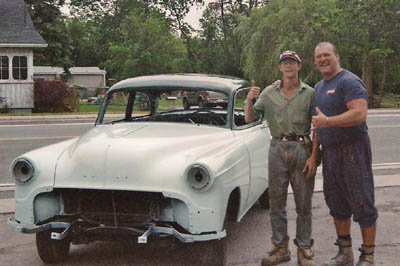
Jet Star, right, and his friend Tom, show off a 1953 Chevrolet Biscayne that he restored.
But his strongest association was formed with a veteran wrestler named Dave McKigney who everyone knew as Bearman or Wildman. Around Aurora, the Bearman was a legend and Star had grown up on a farm idolizing the old mat man who wrestled bears and had once been known as Gene Dubois.
“The Bearman taught me the business,” Jet proudly admits. “When I started with him, I’d take care of the bear and help put up the ring. I’d wrestle in the first match, referee in the third and come back for the fifth match as a manager. I’d get $25 for the night and pay for my own trans and meals.”
The bear was called Gentle Ben. Another of McKigney’s bears was known as Terrible Ted and more than lived up to his name.
“Terrible Ted was a shooter,” Star says in awe.
It wasn’t unusual on Bearman’s tours to sleep on mats or mattresses in the back of the truck or maximize occupancy in a hotel room. You could always put one of the midgets in the tub.
“I learned a lot from Dave. He taught me how to survive. He showed me how to live on $25-$30 a day. He could do more things on a hot plate than they could in a four-star restaurant.”
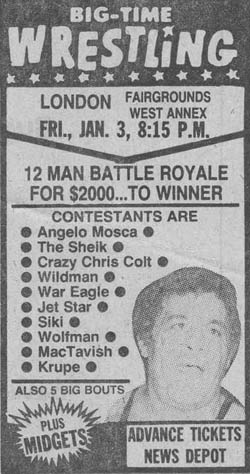
On a Bearman McKigney card.
Star went on several tours with McKigney to the Maritimes. There was an eclectic mix of mat men with the Bearman on the tours, including Big Mac, Sabu, Phil Watson, Chris Colt, Little T, Frenchy Lamont, Wolfman Willie Farkus and Joey War Eagle as well as the girls Debbie Combs and Donna Day.
On the second tour, Bearman and Star were headlining the shows with Texas Death Matches. They pulled out all the stops.
“I like working in a cage,” he says, as a matter of fact.
For various reasons, when the Bearman brought his shows to town, the fans appeared. When they toured the East Coast, there was some stiff competition from other promotions. Bearman’s shows went head to head with JJ Dillon who was working as Nature Boy Dillon on a tour. As well, there was Emile Dupre whose promotion was homegrown and popular after the Len Hughes days. But McKigney’s shows outdrew both competing promotions.
“There were a lot of things the people liked about Dave’s shows,” explained Jet. “The posters were always eye-catching with big name stars, girls, midgets, bears, wolf men and wild men, cage matches, tag teams and all the ingredients for a good night’s entertainment. Bearman knew the business of the business. He gave them everything they wanted.”
McKigney’s shows were loaded with gimmicks and stunts to get the fans out of their seats. He was from the old school. He knew how to promote and market the shows through posters and the media and even driving around town in a car equipped with a bullhorn and a few of the wrestlers who would be appearing on the show that evening.
“It wasn’t done with anything other than the moment in mind,” Star explains.
In the summer of 1988, the Bearman was taking another troupe out east. He wanted Star to headline the shows and his plan was to put his young friend over as champion. But Jet was in the process of getting a fledgling fencing company off the ground and declined the offer much to McKigney’s disappointment. The pair agreed that when Dave returned in September, they would go out to Vancouver with one of the bears to work for Al Tomko.
On that fateful July day, now over 20 years ago, McKigney, Pat Kelly and Adrian Adonis were caught in a finish no one could ever envision. All three were killed when the van McKigney was driving went out of control and crashed on the Trans Canada Highway in Newfoundland when he tried to avoid a moose. The Bearman’s death took a heavy toll on Jet Star. He lost his feel for the game and backed off from active wrestling.
“It was three years before I put the boots back on,” Jet recalls today. “I lost a brother, man. It put a bad taste in my mouth.”
“Jet was always a good worker and extremely loyal to the Bearman,” noted Duncan McTavish who has been in the ring with the best.
It was Big Mac that called one day and convinced Jet to get back in the ring. Afterwards, it was The Sheik who wanted him to work in several small towns in Ohio and Michigan. He had known The Sheik for years and had worked with Farhat’s nephew Sabu.
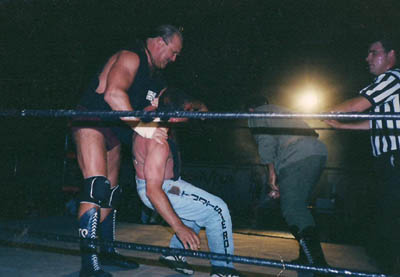
Jet Star ties up an opponent.
“Sabu and I were working for the Bearman at the time. Dave wanted me to do an extra match one night. I agreed if I could choose my opponent. I picked Sabu. He had been in the business for about six months but wasn’t making any headway. The guys weren’t giving him anything. We worked well together. We went 28 minutes and I told the referee I was going to put Sabu over. That was the beginning for him and the next season he was on his own. I have the greatest respect for Sabu. He can’t smell fear. He’d do all the high spots. It was scary.”
Star worked best with opponents such as Sabu and Ricky Johnson. He also had a healthy respect for the older guys like Luis Martinez and McTavish.
“I worked with Martinez when he was about 70,” recalls Jet. “We had a great match for 22 minutes. Afterwards in the room, he made sure several of the younger guys heard him when he said, ‘That’s how you do a wrestling match.'”
Star has rubbed shoulders with greatness on many occasions. In 1986, he was thrilled to be invited by Angelo Mosca to appear on “Mosca Mania” at the Copps Coliseum in Hamilton. Headlining the card were Ric Flair and Dusty Rhodes while the Road Warriors, Animal and Hawk, squared off with Nikita Koloff and Baron von Raschke.
Jet was slated to meet Joey War Eagle in the opener and Mosca’s instructions were that the pair would “go broadway.” Star and War Eagle had met on numerous occasions and were familiar with each other’s style. But there were 14,000 in attendance and Joey had other plans, trying to do some different moves at Jet’s expense. Star became somewhat perturbed and decided to bring him down with a dirty hit, then hooked and cradled him for the pin. But referee Duncan McTavish refused to count, pleading with Jet to follow the agreed upon finish. When Star refused, Duncan disqualified him.
“Mosca was livid. He jumped about ten feet high, dressing us down for not following the plan to stretch it out to the 15-minute time limit,” laughs Jet. “The finish in our match was to be a draw. The Flair-Rhodes match was to end in a disqualification.”
But he has a pleasant memory from that card. He decided to dress up for the evening and wore his best three-piece suit in the dressing room. When the Nature Boy spotted him in the room, he approached the young wrestler.
“Jeez kid, that’s a nice suit,” complimented Flair.
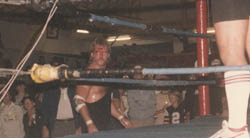
Jet Star bleeds at ringside. Courtesy Maple Leaf Wrestling – Pictorial.
To this day, Star doesn’t know if Flair was impressed with his taste for clothes or the fact their suits were similar.
His independent streak runs deep. On one occasion for The Sheik in Michigan, he was teamed with the Disco Inferno against the Rock and Roll Express, Ricky Morton and Robert Gibson. Star was insulted when the promoter suggested he lie down for the Express. Not wanting any part of the match, he decided to sit at ringside with the fans who soon gathered around him for a beer. As the match progressed, Jet moved to each side of the ring with the beer-guzzling fans following suit. Finally he jumped back in the ring and was drop-kicked by one of the Express to set up the pin. It was his way of making a statement although it tested friendships.
Six years ago, Jet worked out in Calgary for the Hart family, an experience he still treasures. The patriarch, Stu Hart, was still alive and Star has not forgotten his time in the west, particularly the amazing amount of wrestling memorabilia and sense of history in the Dungeon.
He has also worked for Jerry Lawler in Memphis and once tried to break into Florida Championship Wrestling without success. Strangely enough, he confides that working in a new territory is one of his toughest tasks to face. He loves the road but sometimes is uncomfortable in new surroundings. He is much more at ease in his own comfort zone.
While he may be content operating his own body shop — Always Paint and Body — as part of a friend’s car business, he has not closed the door on his wrestling career or a chance to promote. Ever respectful of the business, he nonetheless laments the state of affairs in the game today.
He realizes it’s extremely difficult to put together independent shows but drawing on his experience with an old time promoter like the Bearman, he’d like to try it with a summer promotion.
“In a lot of matches I’ve seen, they don’t mean anything. People are sitting on their hands. Some of the guys lack experience and they’re not working hard enough to rectify the problems,” he analyzes. “If there’s no chemistry or timing between guys, the match will fall flat. Too many don’t know how to finish a show. Today you need lots of in-house angles. You have to give the fans a reason to come back otherwise you’re just robbing yourself.”
Jet has yet to officially retire. Last year he was slated to work a show in Oshawa but when the agreed upon conditions collapsed, he settled for an appearance only at the show. He is not desperate to work. As always the conditions must be to his liking.
He has kept himself in good shape, carrying about 276 pounds on a muscular frame over six feet. He is quite capable of going to work today. But his friend Duncan McTavish has observed another bright spot in Star’s future. Ever the industrious businessman, Duncan has also surmised that with today’s economy, people will be repairing their cars at body shops like Jet’s rather than buying new ones.
“He is quite impressive in the ring,” McTavish says. “I wish he had followed his dream because he certainly would have been an asset to any promotion.”
One senses that Jet Star still has the smell of canvas deeply embedded in his psyche. He maintains that there are two types of wrestlers — the ones that are made and the ones that are born. He leaves little doubt as to which category he believes aptly describes him. It is perhaps why he has never officially ended his career.
Even in the competitive world of professional wrestling, some dreams never die and most wishes come true sooner or later.
